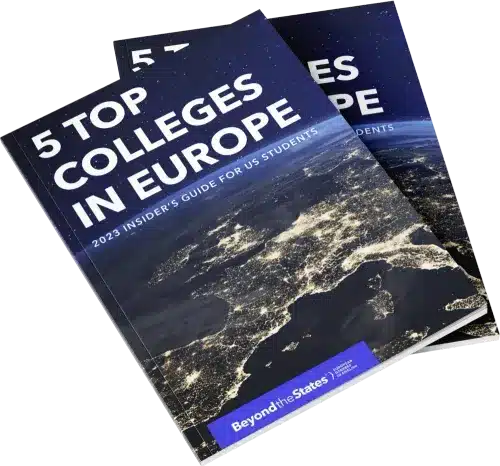Why hasn’t the idea of college in Europe caught on?
Though I would say that both Tom and I are comfortable with uncertainty, I admit that he is more likely to explore and embrace new or unconventional ideas long before they hit the mainstream. I can’t tell you how many times I’ve teased him for some seemingly kooky health idea he started incorporating into his routine. From using coconut oil for just about everything to eating fermented foods for gut health. Sure enough, soon after I would read about the same thing in the New York Times or see a book review about the microbiome. Before I knew it, many of these “kooky” ideas were much more mainstream and even I was on board. Luckily, Tom is very good about not lording “I told you so” over me in these instances…
FREE INSIDER’S GUIDE

Top 5 English-Taught Colleges in Europe
Kickstart you education abroad with a powerful degree taught entirely in English, all without taking on any student loans!
Your psychological threshold.
As you know, we are passionate about young people and parents knowing about their college options in Europe. Both the drawbacks of the US system and benefits of Europe are so incredibly clear that we wonder why more people haven’t already packed their bags. Sure, the lack of information out there (until we came along…) is part of it, but why else? Why hasn’t this idea caught on? We listened to an episode of Malcolm Gladwell‘s great podcast Revisionist History called “The Big Man Can’t Shoot” which really crystallized this to us. It talks about how some people have a harder time making decisions that are outside of group norms than others, even when the benefits of changing are quite clear (Gladwell’s interview on the Tim Ferriss Show is excellent. He gives the advice that US students should get out of the US and go to Europe. — Tom).
The traits of individualism.
If you are already exploring the option of college in Europe, you likely have what sociologist Mark Granovetter refers to as a “low threshold”. The threshold Granovetter refers to is “the number or proportion of people who must make one decision before a given actor does so”. This means that you are more comfortable making decisions based on reasoning or instinct as opposed to what the crowd does. We believe that this trait is crucial for true success in life. You may also be somewhere in the middle for threshold. While you don’t need the group approval, you want to explore more data before making decisions based on unconventional ideas. If we were to put threshold on a scale of 1-10, Tom would probably be a 1 or 2 and I would be closer to a 4-5.
For those of you who are more like me, I have a few summer reading/watching suggestions that will point to the fact that looking for alternatives to the problems we have in higher education here is not a hare-brained idea, despite the fact that you’re the only one in your peer group who’s doing it.
We’ve already recommended the documentary, Race to Nowhere, and Frank Bruni’s book, Where You Go Is Not Who You’ll Be: An Antidote to the College Admissions Mania.
Strategize the Path to College in Europe
We’ve set aside some time this week for one of our admissions experts to help
serious applicants with some ideas. Book a FREE call today; spots are limited!
Recommended reading.
Excellent Sheep: The Miseducation of the American Elite and the Way to a Meaningful Life As a professor at Yale, William Deresiewicz saw something that troubled him deeply. His students, some of the nation’s brightest minds, were adrift when it came to the big questions: how to think critically and creatively and how to find a sense of purpose maidthis. Now he argues that elite colleges are turning out conformists without a compass.
Most Likely to Succeed: Preparing Our Kids for the Innovation Era by Tony Wagner and Ted Dintersmith In Most Likely to Succeed, an educator and an entrepreneur argue that the American education system needs drastically changed to better equip students for the realities of the twenty-first century economy.





